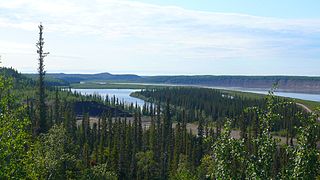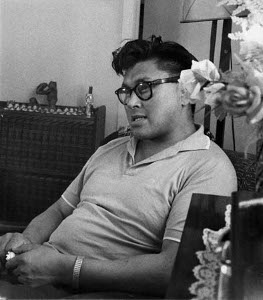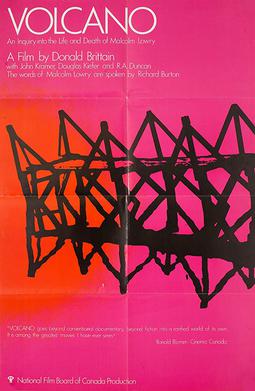Related Research Articles

The Mackenzie River is a river in the Canadian boreal forest. It forms, along with the Slave, Peace, and Finlay, the longest river system in Canada, and includes the second largest drainage basin of any North American river after the Mississippi.
In Canada, an Indian reserve is defined by the Indian Act as a "tract of land, the legal title to which is vested in His Majesty, that has been set apart by His Majesty for the use and benefit of a band." Reserves are areas set aside for First Nations, one of the major groupings of Indigenous peoples in Canada, after a contract with the Canadian state, and are not to be confused with Indigenous peoples' claims to ancestral lands under Aboriginal title.
Ian Gardiner Waddell was a Canadian politician, author and filmmaker. He served in the House of Commons of Canada from 1979 to 1993, and in the Legislative Assembly of British Columbia from 1996 to 2001.
Stephen Kakfwi is a Canadian politician, who was the ninth premier of the Northwest Territories. His sixteen-year tenure in the cabinet of the Northwest Territories is the longest in the Territories' history.
Thomas Rodney Berger was a Canadian politician and jurist. He was briefly a member of the House of Commons of Canada in the early 1960s, entering provincial politics thereafter. He led the British Columbia New Democratic Party for most of 1969, prior to Dave Barrett. Berger was a justice of the Supreme Court of British Columbia from 1971 to 1983. In 1974, Berger became the royal commissioner of the Mackenzie Valley Pipeline Inquiry, which released its findings in 1977. After retiring from the bench, Berger continued to practise law and served in various public capacities. He was a member of the Order of Canada and the Order of British Columbia.
Mackenzie, Mckenzie, MacKenzie, or McKenzie may refer to:
Martin Joseph O'Malley is a Canadian journalist and writer. He has written for CBC News and The Globe and Mail. O'Malley is perhaps best known for a Globe and Mail column in which he coined the line about laws that criminalized homosexual behavior that Canadian Prime Minister Pierre Trudeau later made famous: "There's no place for the state in the bedrooms of the nation."
The Mackenzie Valley Pipeline Inquiry, also known as the Berger Inquiry after its head Justice Thomas Berger, was commissioned by the Government of Canada on March 21, 1974, to investigate the social, environmental, and economic impact of a proposed gas pipeline that would run through the Yukon and the Mackenzie River Valley of the Northwest Territories. This proposed pipeline became known as the Mackenzie Valley Pipeline.
Georges Henry Erasmus, OC is a Canadian politician. He was the national chief of the Assembly of First Nations from 1985 to 1991.
Donald Code Brittain, was a film director and producer with the National Film Board of Canada.
The Paulette Case refers to the filing of a legal caveat concerning the different interpretations of Treaty 8 and Treaty 11 between the Government of Canada and the Denesoline in the Northwest Territories (NWT).
The Mackenzie Valley Pipeline, also called the Mackenzie River Pipeline, was a proposed project to transport natural gas from the Beaufort Sea through Canada's Northwest Territories to tie into gas pipelines in northern Alberta. The project was first proposed in the early 1970s but was scrapped following an inquiry conducted by Justice Thomas Berger. The project was resurrected in 2004 with a new proposal to transport gas through the sensitive arctic tundra. Probabilistic estimates of hydrocarbons in the Mackenzie Delta and Beaufort Sea regions project that there are natural gas reserves of 1.9 trillion cubic metres. After many delays, the project was officially abandoned in 2017 by the main investment partners citing natural gas prices and the long regulatory process.
John Allen Livingston was a Canadian naturalist, broadcaster, author, and teacher. He was most known as the voice-over of the Hinterland Who's Who series of television zoological shorts in the 1960s.
The Alaska gas pipeline is a joint project of TransCanada Corp. and ExxonMobil Corp. to develop a natural gas pipeline under the AGIA, a.k.a. the Alaska Gas Inducement Act, adopted by Alaska Legislature in 2007. The project originally proposed two options during its open season offering over a three-month period from April 30 to July 30, 2010. An 'open season' in layman's terms is when a company conducts a non-binding show of interest or poll in the marketplace, they ask potential customers "if we build it, will you come?".

Martyn Burke is a Canadian director, novelist and screenwriter from Toronto, Ontario.

Abraham "Abe" Okpik, CM was an Inuit community leader in Canada. He was instrumental in helping Inuit obtain surnames rather than disc numbers as a form of government identification. He was also the first Inuk to sit on what is now the Legislative Assembly of the Northwest Territories and worked with Thomas Berger.

Volcano: An Inquiry into the Life and Death of Malcolm Lowry is a 1976 documentary film directed by Donald Brittain and John Kramer for the National Film Board of Canada.
Hugh Brody is a British anthropologist, writer, director and lecturer.
George Calef is a Canadian wildlife biologist, author and photographer, who won the Governor General's Award for English-language non-fiction at the 1981 Governor General's Awards for his nature book Caribou and the Barren-Lands.
Phoebe Rose Nahanni was a Slavey-Dene geographer and cartographer. She played a central role in the Dene Nation mapping project, which constructed a map of how the Dene Nation actively used about 450,000 square miles of land. This information was one of the factors in the Mackenzie Valley Pipeline Inquiry's recommendation not to construct a pipeline through the Mackenzie River Valley. Nahanni was also active in the social scientific study of arctic and subarctic communities, and is thought to have been the first Slavey-Dene woman to hold a master's degree.
References
- 1 2 3 "Inquiry film sets a precedent". The Globe and Mail , May 7, 1977.
- ↑ "Canadian Film Awards 1949-1979". Northern Stars.